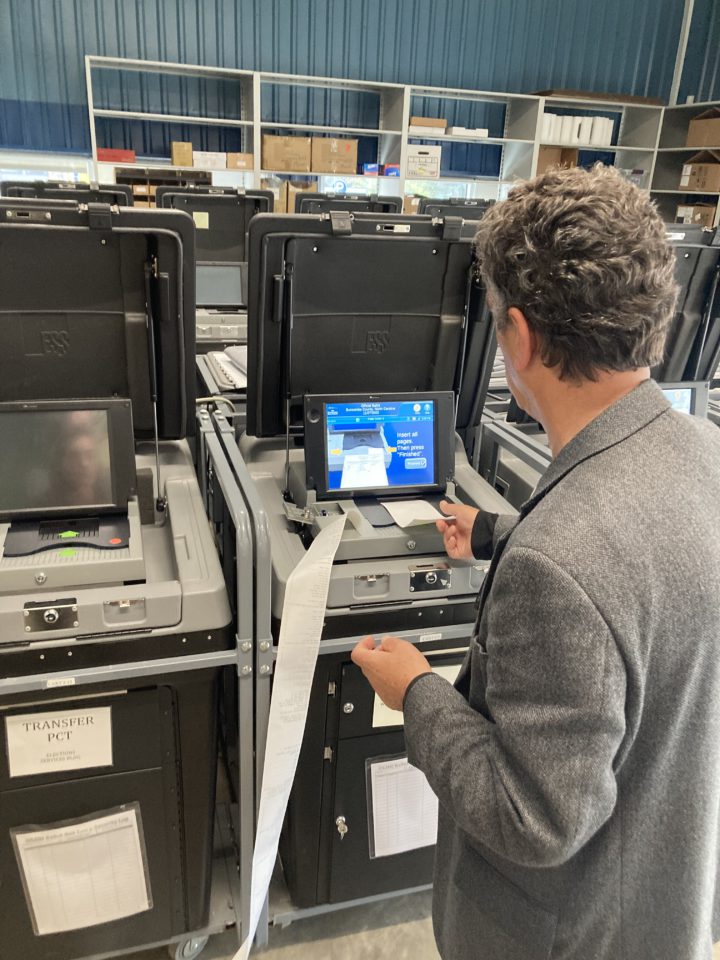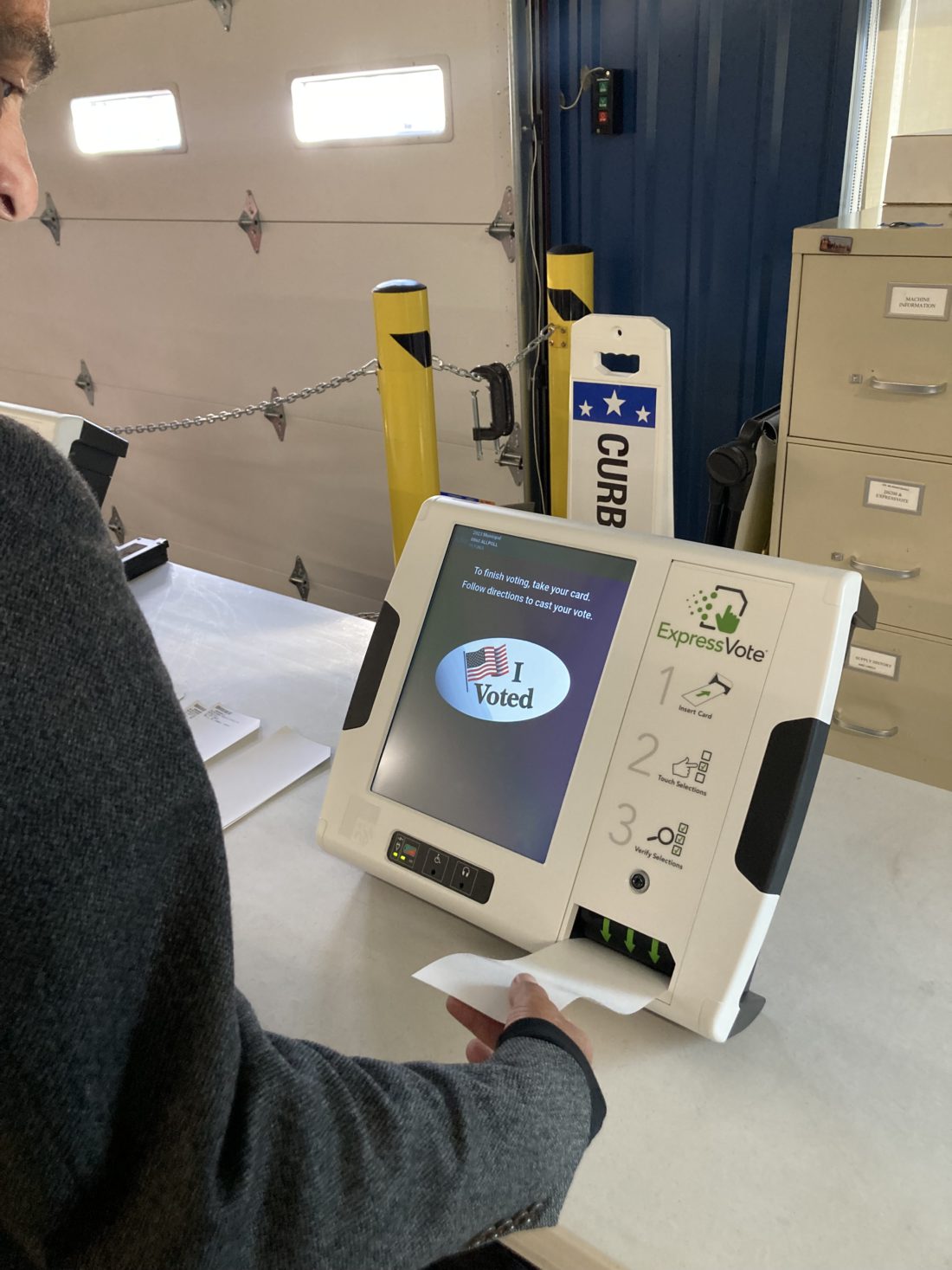Voters in Weaverville and Woodfin will be the first in Buncombe County to use an electronic method to mark ballots that could save them time at the polls.
The ExpressVote machines have been in use in Buncombe since 2020, primarily for those with vision and other disabilities. As part of the fiscal year 2023-24 budget, the county Board of Commissioners approved spending more than $600,000 to purchase 140 ExpressVote machines for use at all early-voting locations.
During the 2024 election, 10 machines will be located at each of the county’s 14 early-voting sites. On Election Day, the machines are only available for those with disabilities. The majority of voters are provided with a traditional preprinted ballot to be marked with a pen.
The new system replaces the old, ballot-on-demand printing system. That system relied on printers at each voting site to print on demand a ballot with the proper races for any voter in the county. Those printers were aging out of service, and were time-consuming to maintain, says Corinne Duncan, Buncombe’s director of elections.
Duncan says the devices will save voters time at the polls, save staff time processing results and save significant amounts of paper, among other benefits.
“There are a lot of very, very attractive features for different stakeholders. And the voters, I think that they will find the voting transaction to be faster and easier to accomplish during early voting with the ExpressVote machine,” says Jake Quinn, chair of the Buncombe County Board of Elections.
“We were getting frustrated with the amount of maintenance that the ballot-on-demand system needed and the cost of the consumables. And then the vendor just decided not to support the type of printer that we currently have,” Duncan says.
Options included reinvesting in a new fleet of ballot-on-demand printers, going all paper by preprinting ballots for each jurisdiction at every early-voting location or switching to the ExpressVote system, she says. ExpressVote, which is used by 11 other North Carolina counties, won out.
New procedures at early voting
As always, Buncombe County voters will be able to go to any early-voting location in the county to cast their ballot. Instead of waiting for a unique ballot to print as in previous years, they will be given an ExpressVote cardstock, a narrow piece of thermal paper with their precinct and ballot style printed on the top. Otherwise, the cardstock is blank.
Instead of proceeding to a voting booth with a pen, voters will approach an ExpressVote machine, where they will insert the cardstock, and be prompted to vote in the relevant races on a screen. Voters can toggle back and forth between races to make selections until they are satisfied with their choices, at which point the “ballot” will print out with their selections printed on it.

Just as in previous elections, voters will then proceed to a vote tabulator machine and insert the ballot themselves. The ExpressVote machines do not retain any data from vote selections but instead are simply a glorified ballot-marking device, Duncan says.
As a result, there are no implications for data security with the new machines, Duncan says.
Meanwhile, officials anticipate the new machines will provide a streamlined process for voters and help limit or eliminate overvotes — when voters choose more than the required number of candidates for a race — and undervotes — when voters select fewer than the required number of candidates for a race.
“The other great thing about it is, let’s say you’re going through, you’re making selections, and you realize, ‘Oh, no, that’s not the candidate that I wanted to vote for.’ You just go back and change it. You don’t have to go to a poll worker and spoil your ballot and go through that whole process, you can take care of it yourself,” Duncan says.
Additionally, for races with write-ins, voters will type in their preferred candidates rather than physically writing them in, which will greatly reduce the amount of staff time required to determine whom people voted for, Quinn says.
Previously, Elections Board members and staff spent hours determining voter intent on races, especially those with write-in candidate options, where a surprisingly large number of voters write in Mickey Mouse every year, Quinn says.
Plus, ExpressVote will save staff time on data reporting. Previously, early voting vote totals were organized by early voting location, not precinct, because anyone can vote at any location during early voting. Now, because of the coding on the ExpressVote ballots, the tabulators will be able to hold votes by precinct at each voting site, meaning officials can report early-voting results by precinct on election night, rather than up to 30 days later, Duncan says.
“From an election administration standpoint, it’s going to make it easier for us,” Quinn adds. “From a data management and data reporting standpoint, ExpressVote is a boon to us.”
In addition, Duncan says the new system will save at least half the amount of paper as the ballot-on-demand system.
ExpressVote elsewhere
Voters in Haywood, Henderson and Transylvania counties have been using ExpressVote machines during the early-voting period since at least 2020 with great success, their election directors say.
Robert Inman, director of elections in Haywood County, says once voters got used to switching to the ExpressVote system, feedback has been overwhelmingly positive.
“I think it’s an enormous advance in line management, the space it takes to do this and the speed in which you can actually process a voter. From the time they present themselves to vote to the time it takes them to use the ExpressVote and go to the tabulator is much faster than what [it takes them] to mark little ovals on a piece of paper. By far,” he says.
Aaron Troutman, an elections specialist in Henderson County, says the system really helps in a county like Henderson, where there are many different ballots because several district lines split the county.
ExpressVote allows him to code each machine with ballots for all 35 precincts, with every possibility of overlapping jurisdiction, instead of keeping so many extra ballots on hand at each voting site, he says.
In Transylvania County, Director of Elections Jeff Storey says the ExpressVote system saves the county both time and materials.
Feedback from voters has been so positive that they’ve asked why the county doesn’t also use the machines exclusively on Election Day, an investment it hasn’t yet been willing to make, Storey says.
In Mecklenburg County, home to Charlotte, the state’s largest city, Director of Elections Michael Dickerson says officials adopted ExpressVotes for both early voting and Election Day in 2020 and haven’t had any significant issues.
Dickerson says the best benefit of the system is how much paper he saves, making the purchase of the machines “easily” worth the investment.
“I would recommend [ExpressVotes] to any county,” he says.
In Buncombe County, it’s unclear if there is appetite to expand the new system to Election Day. Because of the large expense it would take to equip all 80 precincts with enough machines, Duncan says the county hasn’t considered it extensively. First, she wants to get through the 2023 municipal and 2024 presidential elections.
Duncan says the current lot of machines will pay for themselves in saved time and materials within the 10- to 15-year life span of the machines.
Whether an expansion happens, Quinn says he sees no downsides to the new machines.
“We’ll be using these machines far, far after I’m on the Board of Elections,” he says.



Before you comment
The comments section is here to provide a platform for civil dialogue on the issues we face together as a local community. Xpress is committed to offering this platform for all voices, but when the tone of the discussion gets nasty or strays off topic, we believe many people choose not to participate. Xpress editors are determined to moderate comments to ensure a constructive interchange is maintained. All comments judged not to be in keeping with the spirit of civil discourse will be removed and repeat violators will be banned. See here for our terms of service. Thank you for being part of this effort to promote respectful discussion.